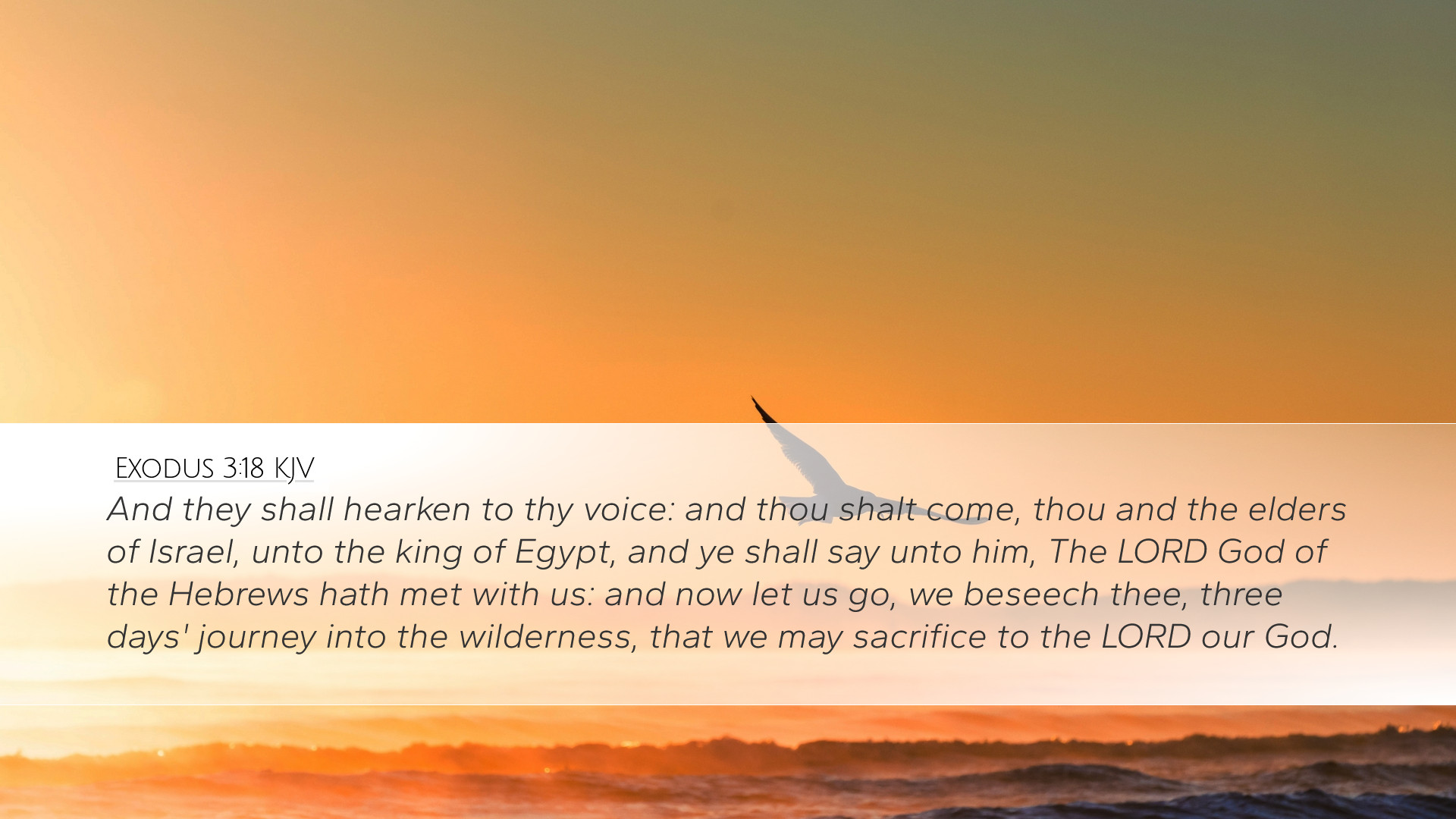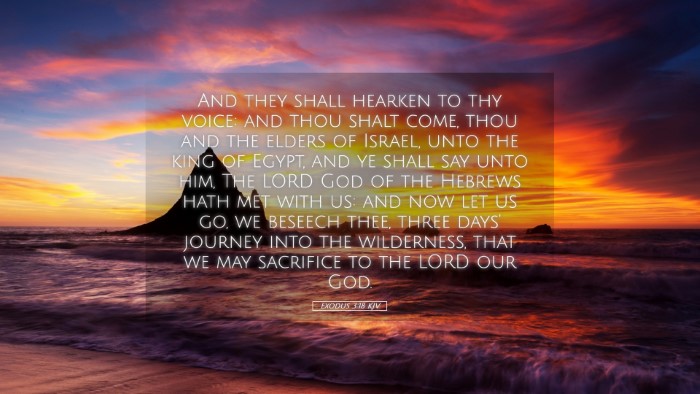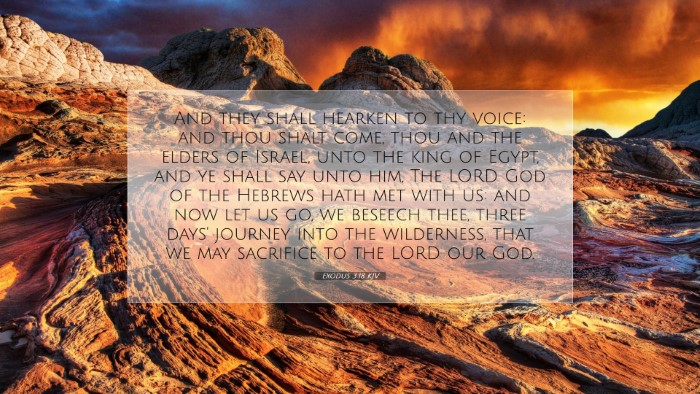Commentary on Exodus 3:18
Bible Verse: "And they shall hearken to thy voice: and thou shalt come, thou and the elders of Israel, unto the king of Egypt; and ye shall say unto him, The LORD God of the Hebrews hath met with us: and now let us go, we beseech thee, three days’ journey into the wilderness, that we may sacrifice to the LORD our God." (Exodus 3:18, KJV)
Introduction
This verse is critical in the narrative of Exodus as it encapsulates God's instructions to Moses regarding the deliverance of the Israelites from Egyptian bondage. The call to approach Pharaoh is fraught with theological and practical significance that has echoed throughout the ages. This commentary seeks to delve into the implications of this verse drawing on the insights from public domain commentaries, particularly those of Matthew Henry, Albert Barnes, and Adam Clarke.
Contextual Background
The setting of Exodus 3 is pivotal, where Moses encounters God through the burning bush. This divine meeting positions Moses as the chosen leader who will confront Pharaoh and lead the Israelites to freedom. Understanding the context in which God commands Moses to ask for the Pharaoh's permission reveals the nuances of faith, authority, and obedience to divine instructions.
God's Assurance in Leadership
Henry emphasizes that God's affirmation to Moses, "and they shall hearken to thy voice," serves as a reassurance of divine support. It’s a crucial promise that reflects the divine authority bestowed upon Moses. Leaders often wrestle with the fear of rejection when directing others, but here, God reassures Moses that his voice will be heard and respected by the elders of Israel.
The Role of Elders
According to Barnes, the elders play a vital role in the deliverance narrative. They are the representatives of the Israelite community and are significant in presenting a united front before Pharaoh. By including the elders, Moses not only aligns himself with established authority but also strengthens his position in negotiating with Pharaoh.
Divine Assurance of Response
Clarke adds that the promise that the Israelites would listen represents a crucial turning point. Here, God affirms that His people will be receptive to the message. This highlights an essential aspect of leadership—God uses those who are obedient and willing to be His voice in difficult circumstances.
The Call to Pharaoh
The directive to approach Pharaoh poses significant implications. It symbolizes a direct challenge to the authority of Egypt, often viewed as the epitome of power and oppression. The phrasing, "the LORD God of the Hebrews hath met with us," emphasizes the personal, covenantal relationship between God and His people. This invocation of identity is pivotal in the struggle for liberation as noted by Henry.
Importance of the Petition
The request, “let us go, we beseech thee,” reflects humility and earnestness in the plea for liberation. Even though God commands the action, the approach is measured and respectful. This showcases a model for how believers might engage with authorities—addressing them with respect while firmly stating their needs and convictions, as portrayed in Barnes' commentary.
The Wilderness as a Place for Worship
The request for three days' journey into the wilderness signifies not merely a physical relocation but an opportunity for worship. Clarke points out that this journey is not just about fleeing but about engaging in sacrifice to the Lord, highlighting the dual purpose of spiritual devotion and physical liberation. Worship is central to the identity of the Israelites, which they seek to reaffirm outside the oppressive environment of Egypt.
Theological Implications of Sacrifice
Henry further elaborates that this call to sacrifice underscores the significance of communal worship in Hebrew culture. It is an acknowledgment of their covenant relationship with God, who demanded worship as part of their identity. The request for a temporary reprieve signals an assertion of their rights as God's chosen people, which is a vital theological reflection for believers today.
Preparation for Opposition
As Moses prepares to confront Pharaoh, it is important to recognize that this request will set the stage for subsequent challenges. Barnes notes that the difficulties Moses will face in gaining Pharaoh’s acquiescence foreshadow the trials in the journey toward freedom. This segment of the narrative serves as a reminder that divine guidance does not exempt one from struggles; rather, it equips leaders to face them.
Conclusion
In summary, Exodus 3:18 is rich with meaning for pastors, students, theologians, and Bible scholars. It encapsulates themes of divine assurance in leadership, the formation of community, the importance of worship, and the necessity of addressing authority with respect and firm conviction. By understanding this verse in its context and through the lens of established commentaries, one can appreciate the depth of God's engagement with His people, the complexity of their struggle, and the hope embedded within their journey toward freedom.
As we reflect on this passage, may we embody the spirit of Moses, carrying forth God's message with courage, humility, and a commitment to worship amidst the challenges we face in our own contexts.


